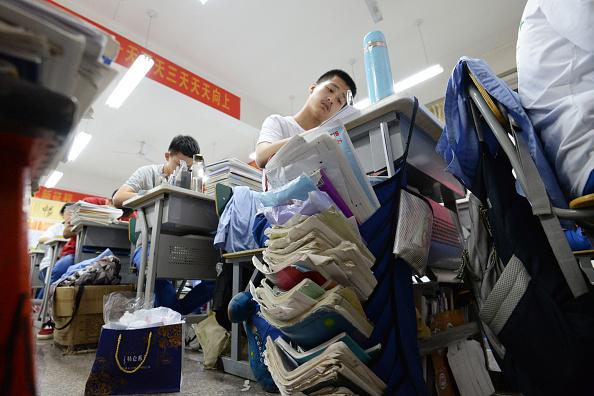Around late October to early November is usually the time in China when high school seniors sign up for the gaokao, the nationwide college entrance exam that determines which university they will be placed in.
But in the southwestern Chinese city of Chongqing, education authorities caused an uproar when it evoked a Cultural Revolution-era concept in its announcement for gaokao registration.
Furthermore, the concept has been widely used by the Chinese regime in recent years to persecute members of a religious minority.
On Nov. 6, local media ran an announcement from the city’s test academy reminding students that they must pass a “zhengshen,” which translates literally to “political investigation” in order to be eligible to take the gaokao.
The term was used during the Cultural Revolution to refer to an investigation to suss out whether an individual, as well as his family and relatives, was aligned with the Chinese Communist Party’s ideology. Scores of youth were denied the opportunity to attend university because they or their families did not have proper political backgrounds. The Cultural Revolution campaign is estimated to have caused the deaths of millions of Chinese.
This announcement sparked an outcry among netizens, who called out the Chongqing education authorities for recalling a brutal history of persecution.
“If you don’t love the Party, then you are stripped of the right to education. Do we even have any rights?” one netizen wrote.
A few days later, on Nov. 9, the test academy in Fujian Province made a similar announcement, telling students that they will be subject to a “ideology, politics, and moral character evaluation.”
“Those who exhibit thoughts and actions that are against the Chinese constitution’s basic principles, have participated in heretical religious activities, or have other such serious circumstances” would not be allowed to take the gaokao, according to the notice.
The Chongqing test academy finally responded on Nov. 8 to the debacle with a statement, saying it chose the wrong word and meant to refer to a routine assessment of students’ ideological background. Meanwhile, in an interview with a Chinese news magazine, the test academy denied culpability and said that it was the local journalists who made the mistake of using that term in the media reports.
Soon thereafter, some netizens posted photos allegedly of the registration forms students are required to fill out, labeled clearly as “zhengshen form.”
Dark History
Many Chinese intellectuals today recall that “zhengshen” were still commonplace as recently as the 1980s.
“In the 1990s, the Chinese regime relaxed the ‘zhengshen’ a bit, but it was not completely abolished. After the Chinese regime started persecuting [spiritual group] Falun Gong, ‘zhengshen’ for many gaokao students were revived and strengthened,” said current affairs commentator Heng He.
The Epoch Times reviewed the Ministry of Education’s announcements for gaokao students in the past two decades and found that since 2000, the ministry has explicitly called for “ideology, politics, and moral character evaluations.”
Such terminology was not prevalent prior to 2000.
After then-Communist Party Jiang Zemin launched a nationwide persecution of Falun Gong in July 1999, the gaokao registration commonly included a stipulation that students cannot be involved in “heretical religious organizations.”
Falun Gong, also known as Falun Dafa, is a meditation practice based on the principles of truthfulness, compassion, and tolerance. The popularity of the practice—official estimates in the late 1990s place the number of adherents around 70 million to 100 million—and its failure to conform to communist orthodoxy led Jiang to the decision to ban and persecute the practice.
The Party’s propaganda apparatus was directed to vilify Falun Gong and any who practiced it. One of the Party’s primary means of doing so was by labeling Falun Gong a “heretical religious organization,” which was often rendered as “cult” in English.
In a 2008 recruitment notice by military academies for prospective middle and high school students, the “zhengshen” requirements explicitly spell out those who are not qualified: “[those who have] next of kin or close relatives who are currently being investigated as suspects under the legal system, or are main members of Falun Gong and other illegal organizations.”
Young Falun Gong practitioners, or children of Falun Gong practitioners who do not practice the faith themselves, have routinely been denied their rights to a fair education as a result of such persecution.
According to Minghui.org, a U.S.-based website that tracks the persecution of Falun Gong in China, Liu Zonggang is a Falun Gong adherent residing in a village within Shougang City, Shandong Province. Although his son’s gaokao marks were outstanding, his son was not accepted to any university because Liu and his wife practiced Falun Gong.
From Laiwu City, also in Shandong, Falun Gong adherent Wang Zi’s daughter was kicked out of school, denied her high school graduation certificate, and denied her right to take the gaokao, under pressure from local police.
Zhang Haiyan, who now resides in the United States, recalled to the Chinese-language Epoch Times in a July 2017 interview that in high school, he traveled to Beijing with his family, all Falun Gong practitioners, to speak out against the Chinese regime’s persecution.
He and his family were taken away by police and detained for several days. Though he scored well on the gaokao, he was not accepted at the schools he placed on his list of desired placement. He was only allowed to enroll in a school the education authorities assigned him to.
Later, when he tried to apply for a graduate school program at Xiamen University, a school representative told Zhang that he was not accepted because all students must fill out a “zhengshen” form where it asks whether the student or the student’s family have practiced Falun Gong or are currently practicing the faith. The representative told him, “We know it’s hard for you to answer.”
Zhang did not get accepted and decided to join the workforce after graduation.





